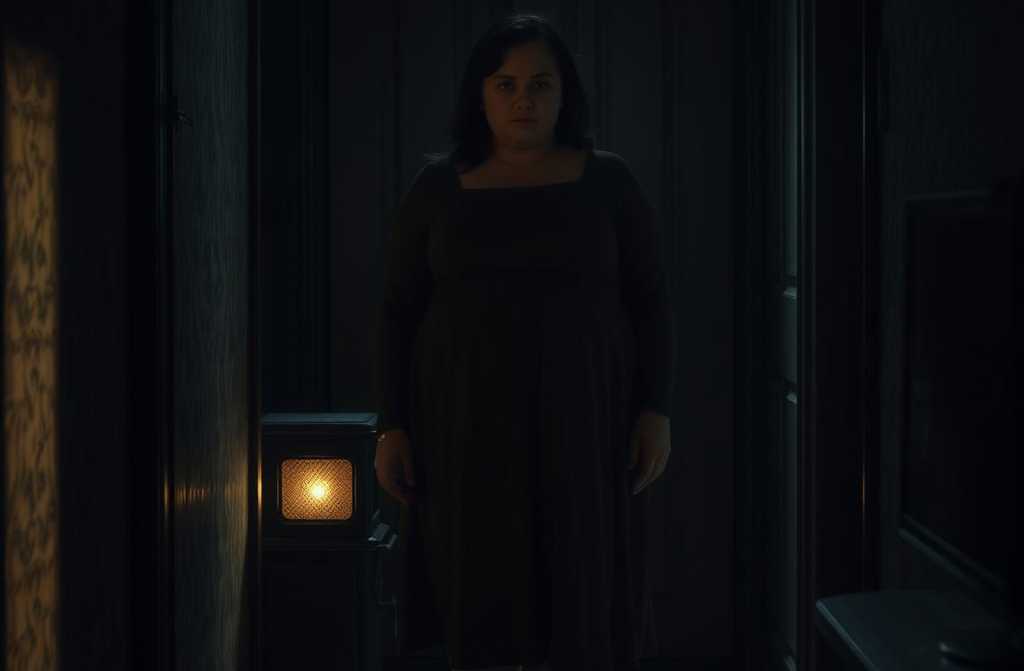Lucy was plump. Shed just turned thirty, and the scales tipped at nineteen stone. Maybe it was some illness to blamea glitch in the system, a rogue metabolism. She lived in a forgotten little town, the sort of place that clung to the edge of the map like a stubborn crumb. The nearest specialists were miles away in the county, an impossible journey both in distance and cost.
Time in that town didnt tick by clocksit seeped through the seasons. Winter froze it solid, spring drowned it in mud, summer choked it with heat, and autumn wept relentless rain. And in that slow, syrupy crawl of existence, Lucyofficially Lucille, but no one ever called her thatsank deeper into the quicksand of her own body. Nineteen stone wasnt just a number; it was a fortress. A fortress of exhaustion, loneliness, and quiet despair. She suspected something inside her was broken, but the thought of travelling to see a doctor was laughable: too far, too humiliating, and probably pointless.
She worked as a nursery assistant at “Bluebell Cottage,” the local preschool. Her days smelled of talcum powder, overcooked porridge, and perpetually damp floors. Her handsbroad, gentle thingscould soothe a crying toddler, tuck in a dozen cots in record time, and mop up spills so deftly no one ever felt guilty. The children adored her, drawn to her softness and quiet warmth. But their affection was a fleeting comfort against the emptiness that waited for her beyond the nursery gates.
Home was an old prefab, one of eight left over from a bygone era. The building creaked like a galleon in high wind, shuddering at every gust. Two years ago, her mum had passeda quiet, tired woman whod buried all her dreams within those same walls. Her dad? Lucy barely remembered him. Hed vanished long ago, leaving behind only a dusty photograph and even dustier memories.
Life was harsh. The tap gushed icy, rust-coloured water. The loo was outside, transforming into an ice cave in winter and a sauna in summer. But the real tyrant was the woodstove. It devoured two lorry-loads of firewood each winter, gnawing through her meagre wages. Long evenings, shed sit before its cast-iron door, staring into the flames, convinced it wasnt just logs burningit was her years, her strength, her future, leaving nothing but cold ash behind.
Then, one twilight, as grey melancholy filled the room, something miraculous happened. Quiet, unassuminglike the shuffle of her neighbour Maggie in worn-out slippers. A knock at the door, and there Maggie stood, clutching two crisp banknotes.
“Lucy, love, Im so sorry. Heretwo hundred quid. I hadnt forgotten the debt, honest.”
Lucy blinked at the money. Shed written that debt off ages ago.
“Maggie, dont fret. Its fine.”
“No, it isnt!” Maggie insisted, pressing the notes into her hand. “Not now Ive got the cash. Listen”
Lowering her voice like she was sharing state secrets, Maggie spun an unbelievable tale. How a group of lads from Pakistan had rolled into town. One of them, spotting her with a broom, had offered a bizarre and slightly dodgy dealfifteen grand.
“They need citizenship, see. Quick. So theyre hunting for bridespaper onesin backwaters like ours. Yesterday, they married me off. Dont ask how they sorted the registry office, probably greased a few palms, but its all lightning-fast. My blokeRazahes sitting in my lounge right now for appearances. Once its dark, hell go. My daughter, Sophie, said yes tooshe needs a proper coat for winter. What about you? This is your chance. You need money, dont you? And lets face itwhos lining up to marry you?”
The words werent cruel, just brutally honest. A familiar ache flared in Lucys chest, but she only hesitated a second. Maggie was right. A real marriage wasnt in the cards. Her world was the nursery, the corner shop, and that ravenous stove. But fifteen grand? That could buy firewood, new wallpapermaybe even chase the gloom from those peeling walls.
“Alright,” she murmured. “Ill do it.”
The next day, Maggie brought the “candidate.” When Lucy opened the door, she gasped and retreated into the shadowed hallway.
Autumn after autumn, shed replay the scene: her, yelping and stumbling back, trying to hide her bulk. On the doorstep stood a young man. Tall, lean, with a face untouched by lifes roughness and eyes so dark and sad they could swallow the sky.
“Christ, hes just a boy!” Lucy blurted.
The lad straightened. “Im twenty-two,” he said clearly, barely an accent, just a soft lilt.
“See?” Maggie chirped. “Mines fifteen years younger! Yours is practically your agehardly eight years gap. A man in his prime!”
But the registry office refused to marry them outright. The clerk, crisp in her suit, eyed them suspiciously and dryly explained the law required a months wait. “To think it over,” she added, with a loaded pause.
The Pakistani lads left for work, but before going, Razathat was his nameasked for Lucys number. “Its lonely in a strange town,” he explained, and in his eyes, she recognised a familiar achebewilderment.
He called. Every evening. At first, the conversations were brief, awkward. Then longer. More honest. Raza was a brilliant talker. He spoke of his mountains, of a sun that burned differently there, of his mother, whom he adored, and why hed come to Englandto support his family. He asked about her life, her work with the children, and to her own surprise, she talked. Not to complain, but to sharefunny nursery tales, the smell of first spring soil. She caught herself laughing into the receivergirlish, brightforgetting her age, her weight. In a month, theyd learned more about each other than some couples did in years.
When Raza returned, Lucy struggled into her only nice dresssilver, straining at the seamsand felt an odd flutter. Not fear. Anticipation. His mates stood witness, solemn and upright. The ceremony was brisk, businesslike, but to Lucy, it was a spark: the glint of rings, official words, the surreal sense of it all.
Afterward, Raza walked her home. Inside, he solemnly handed her an envelope of cashthe agreed sum. She took it, feeling its weight like the burden of her choice, her despair, her new role. Then he pulled a small velvet box from his pocket. Inside, nestled on black satin, lay a delicate gold chain.
“This is for you,” he said softly. “I wanted a ring, but I didnt know your size. I I dont want to leave. I want you to really be my wife.”
Lucy froze, wordless.
“Ive heard your soul through the phone,” he continued, his eyes alight with something adult and sure. “Its kind. Pure. Like my mothers. Shes gone nowmy fathers second wife, and he loved her fiercely. Ive fallen in love with you, Lucille. Truly. Let me stay. With you.”
This wasnt a paper marriage. This was a proposal. And in his earnest, sorrowful eyes, Lucy saw not pity, but something shed stopped dreaming of: respect, gratitude, and a tenderness blooming right before her.
The next day, Raza left againbut not for good. This time, it was just waiting. He worked in the city with his mates but visited every weekend. And when Lucy discovered she was pregnant, Raza sold his share in their business, bought a second-hand Transit, and came home for good. He started a delivery serviceferrying people and goods to the nearest townand it thrived on his hard graft and honesty.
A son came first. Then, three years later, another. Two beautiful, dark-eyed boys with their fathers gaze and their mothers gentle nature. The house brimmed with laughter, tiny footsteps, the scent of real happiness.
Her husband didnt drink or smokefaith forbade itand he worked tirelessly, gazing at Lucy with such devotion the neighbours grew green-eyed. The eight-year gap melted away, meaningless.
But the greatest miracle was Lucy herself. She bloomed from within. Pregnancy, happiness, caring not just for herself but for a husband and childrenher body changed. The extra stone sloughed away like an outgrown shell, revealing someone lighter, brighter. She didnt diet; life simply filled with movement, purpose, joy. Her eyes sparkled. Her step grew sure.
Sometimes, by the stove (now diligently tended by Raza), watching her boys play on the rug, shed catch his warm, adoring gaze. And shed think of that strange evening, the two hundred quid, Maggies knock. How the







